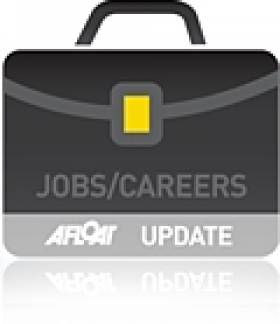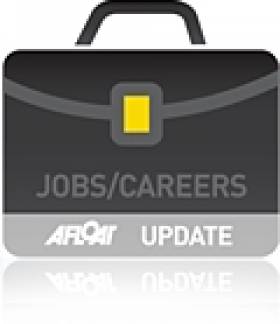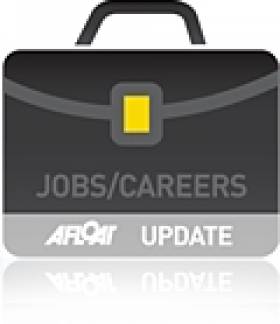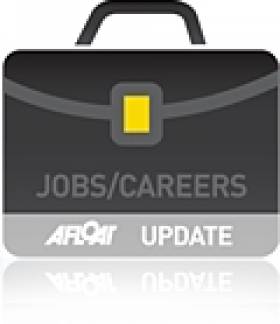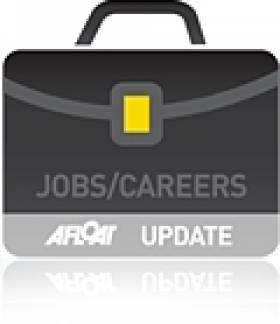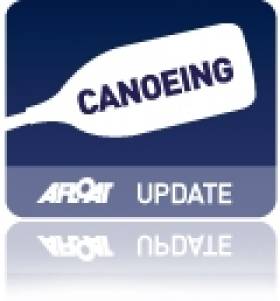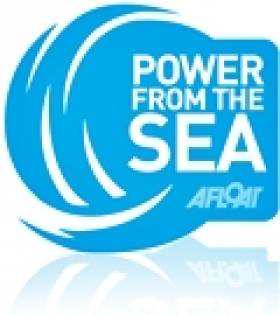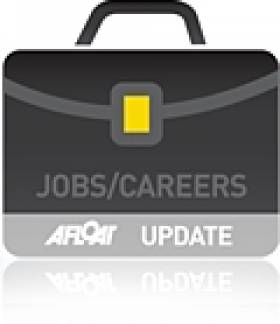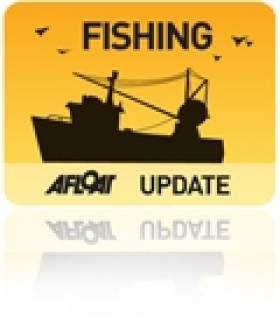Displaying items by tag: jobs
Diving Ireland Recruiting Sports Development Officer
#Diving - Diving Ireland is recruiting for a Programmes Development Officer on a one-year contract.
The governing body for all underwater sport in Ireland under the Irish Underwater Council (CFT) describes the post as "an exciting opportunity to manage and spearhead [its] development programme."
The full-time position, based in Dublin, provides for operational and administrative support for the delivery of Diving Ireland's participation plans.
The Programmes Development Officer will be responsible for planning, delivering and evaluating a development plan for all Diving Ireland participation programmes and courses. These programmes will centre around increase in participation, membership and revenue.
The Programmes Officer will facilitate and co-ordinate opportunities through liaison with commercial providers and clubs, assisting in the planning and running of promotional events across all ages and abilities.
The Programmes Officer will also be responsible for the development and expansion of Diving Ireland's introductory and participation courses. The primary focus will be on capitalising on the potential of the ‘Snorkel Splash’ for introduction to schools as part of the PE curriculum.
Additionally, there will be the wider engagement of clubs and establishing strong working relationships with regional representatives, local authorities and other partners to support the implementation of the development plan.
The closing date for applications is Friday 19 June 2015. Full details of the position and how to apply are available at SportsJobs.ie.
Race Coach / Bosun Vacancy in Hong Kong
#jobsinboats – The Royal Hong Kong Yacht Club, one of the oldest sailing and rowing clubs in Hong Kong, is looking for a talented and youthful dinghy sailor to fill the post of Race Coach / Bosun.
This is a full-time contract based in Hong Kong commencing July or August 2015. Reporting to the Middle Island Sailing and Marine Manager, the successful applicant will coach up and coming cadets to higher levels of racing expertise. Classes of boats include the J80, Optimist, Laser, 420 and 29er. Coaching and mentoring at international events will be involved. Off-water there will be basic fibreglass repairs and maintenance of sailing craft and RIB's to be completed. Middle Island has a clubhouse, sailing academy, hardstand, marina and launching areas serviced by a regular club ferry.
We are looking for people with:
- Extensive dinghy racing experience.
- Graduation from an internationally recognised sail training academy.
- Race Coach qualification is essential with Keel Boat Instructor preferred.
- Excellent interpersonal, team and leadership skills.
- Fibreglass repair experience and confidence to install small boat rigs and deck equipment to a professional standard.
- Flexibility to work weekends and midweek shifts.
We offer attractive remuneration and excellent fringe benefits to the right candidate. Closing date for applications is 15 June 2015. Interested parties should submit a comprehensive CV together with a recent photograph to The Human Resources Manager, Royal Hong Kong Yacht Club, Kellett Island, Causeway Bay, Hong Kong or e-mail to [email protected]
Seasonal Fishery Officers Wanted
#Jobs - Inland Fisheries Ireland (IFI) is currently seeking to recruit a number of staff as Fishery Officers nationally for periods of up to a maximum of six months duration during 2015, and will shortly commence a process to fill these positions.
The Fishery Officer will be primarily concerned with the implementation and enforcement of the provision of the Fisheries Acts, Water Pollution Acts and other relevant statutory provisions. He or she is required to:
- Provide, in co-operation with other fisheries staff, comprehensive conservation and protection services, inland and at sea, within any part of a fisheries district and/or any other area assigned within one or more fisheries districts.
- Provide, in co-operation with other fisheries staff, comprehensive improvement, and development and fisheries management support services within any part of a fisheries district and/or any other area assigned within one or more fisheries districts.
A number of positions will be concerned with assisting either directly or indirectly in fisheries-related research projects. Please note a full driving licence valid in the State is required.
Salary will be at the first point of Fishery Officer Scale (as at 1 November 2013) plus an Unsocial Hours allowance, which will be paid at either 50% or 100% relative to the number of unsocial hours worked.
Applications (a cover letter and up-to-date CV) should be sent by 12 noon on Monday 23 February 2015 to [email protected] or by post to:
HR Department, Ref: ‘HR/FO/2015’
Inland Fisheries Ireland
3044 Lake Drive
Citywest Business Campus
Dublin 24
All enquiries to [email protected] or 01 884 2662. Please note that late applications will not be processed. Canvassing will disqualify. IFI is an equal opportunities employer.
Inland Fisheries Ireland Seeks Senior Scientist
#Jobs - Inland Fisheries Ireland (IFI) is recruiting a senior scientist with a specific focus on statistics and modelling, technical editorial support, GIS and data management.
This permanent leadership role will be part of a dynamic research team conducting research (both national and international) on Ireland’s fish species and will report to the head of research and development.
Applicants will be short listed for interview on the basis of information supplied in their CVs.
For the full job description, see the IFI website HERE. For any further details contact the HR Department, Inland Fisheries Ireland, 3044 Lake Drive, Citywest Business Campus, Dublin 24 at 01 8842 662 or [email protected].
The closing date for receipt of applications is 5pm on Friday 27 February 2015. Canvassing will disqualify. IFI is an equal opportunities employer.
Waterways Ireland Recruiting Temporary Visitor Centre Manager
#Jobs - Waterways Ireland is recruiting for a temporary visitor centre manager (one-year fixed term) at its Grand Canal Quay base in Dublin.
At minimum, applicants must have a either a business-focused degree or equivalent, with two years relevant experience in marketing or sales, or at least five years relevant administrative experience including two years of staff management responsibilities and two years in marketing or sales.
Applicants must also hold a full valid driver's licence and/or access to a form of transport that will allow them to travel to various locations in the course of the role.
Details of the application pack for this position are available on the Waterways Ireland website HERE. The closing date for applications is 4pm on Friday 30 January.
Canoeing Ireland Recruiting Youth & Club Development Officer
#Canoeing - Canoeing Ireland is recruiting a Youth & Club Development Officer to develop youth participation in canoeing and increase both the quantity and quality of canoe clubs in Ireland.
The successful candidate will be in charge of managing the Canoeing Ireland Training Centre with a focus on youth participation, which includes managing delivery of the instructor training initiative in view of club development.
They will also be expected to deliver junior training programmes – and a schools, scouts and youth competition calendar – across a broad range of disciplines.
Managing and delivering adult training programmes to kick start club growth and development will also be part of their remit, as will reviewing and developing new Canoeing Ireland club support materials, including the Club Kick Start Pack, sample constitution and sample SOPs and risk assessments.
Among the biggest requirements will be establishing a Canoeing Ireland Youth Kayaking Academy at the body's training centre at Strawberry Beds as a pilot project to be rolled out to towns and cities nationwide.
The successful candidate will also be expected to contribute at strategic events such as the Liffey Descent and junior and senior Paddlefests, as well as produce content for Canoeing Ireland's print and social media platforms.
Applicants must have at least a level 3 kayak instructorship, a full clean minibus driver's licence, a current CI-recognised first aid cert and a Coaching Ireland tutor qualification, among other requirements. All applications are also subject to Garda vetting clearance.
Full details on this role and how to apply are available via the Canoeing Ireland website HERE - which also has details on a vacancy for an administration officer. Applications must be received by Friday 16 January 2015.
Dublin Docklands Could Be 'Luxury Yachting Destination'
#Docklands - More than 1,200 jobs could be created by making Dublin's Docklands a destination for luxury maritime tourism, as The Irish Times reports.
That's the message from Docklands Business Forum chair Ciaran Flanagan, who claims that developing Grand Canal Basin and the bank of the Liffey opposite as a "world class luxury yachting destination" could bring "about €36 million into the local economy".
The story appears only weeks after Afloat's WMN Nixon asked the question in his weekly blog on Afloat.ie: Who Runs Dublin Bay, The Capital's Waterborne Playground?
Flanagan's comments come ahead of the Docklands Business Awards this Thursday 27 November, which he says "are a key platform to highlight the activity and invocation taking place in the Docklands area but also an important forum to underline the potential the area still holds."
Meanwhile, nearby Dun Laoghaire marina on the south shore of Dublin Bay has tweeted an image of its recent superyacht style visitors. In 2014 it has had a series of high profile visiting superyachts including Superyacht Christoper in June and Arcadia in September.
The Irish Times has more on the story HERE.
#OceanEnergy - A University College Cork project to investigate "nonlinear wave-current interactions in the nearshore" for the development of Ireland's ocean energy industry has been awarded a research grant worth more than half a million euro by Science Foundation Ireland (SFI).
David Henry's marine science research, approved under the 2013 Career Development Awards, is one of 40 projects receiving funding under SFI's double-headed grant scheme that totals some €23 million via the Department of Jobs, Enterprise and Innovation.
"Funding for researchers at the outset of their careers is an important element of the Government’s strategy for job creation in research and innovation under our Action Plan for Jobs," said Innovation Minister Sean Sherlock at the announcement on Tuesday 8 July.
"SFI’s funding schemes for early career researchers help ensure that excellent research with the potential for real economic and societal impact is properly supported in Ireland. Investment like this is important for Ireland’s developing international reputation for excellent research with impact."
SFI has more on the story HERE.
Kildare Firm Creates Jobs With Robot Submarine Deal
#Jobs - RTÉ News reports that Kildare-based firm Cathx Ocean will create 50 jobs over the next two years after winning a contract to supply imaging systems for robot submarines.
Minister for Jobs Richard Bruton welcomed the deal with US company Bluefin Robotics as the latest in a series of international contracts for the Irish marine technology firm, whose products are used for underwater surveys particularly in the oil and gas industry.
The minister was speaking at a trade mission that coincided with the Offshore Technology Conference in Houston, Texas, which saw a number of Irish companies secure new deals with American firms in the offshore energy sector.
RTÉ News has more on the story HERE.
#Seafood - Marine Marine Simon Coveney has announced an award of €2.4 million in grant aid to 20 seafood processing companies under the 2014 Seafood Processing Business Investment Scheme.
The scheme is projected to deliver 157 jobs and €45 million in additional sales by 2016.
Taken in conjunction with private sector investment, the total investment will be almost €8 million in 2014.
The grants are co-funded by the Department of Agriculture, Food and the Marine and the European Fisheries Fund.
“Our seafood industry has the potential to achieve sales of €1 billion per annum by 2017 and to deliver 1,200 additional jobs in that period," said Minister Coveney, who added that the seafood processing sector "is a key growth area in our seafood industry and can make a major contribution to those overall seafood industry growth targets."
The minister also said the investment "will help to build scale, drive innovation and develop value added products to meet the considerable demand on our key international markets. It will enable these companies to invest in the required technology and resources to make this happen.
"I look forward to seeing the positive effect this investment has on the industry, both in terms of employment and sales, over the next three years.”
The 20 companies receiving grant aid are from eight coastal counties across the country: four in Co Cork (Castletownbere Fishermen's Co-Op; Good Fish Processing; Keohane Seafood; Ballycotton Seafoods), three in Co Galway (Cill Chiarain Eisc Teoranta; Iasc Mara Teoranta; Galway Bay Seafoods), two in Co Mayo (Connemara Seafoods Frozen; WM Carr & Sons), four in Co Donegal (Proseail An Clochan Liath Teo; Charles Vial; Earagail Eisc Teo; Arctic Fish), two in Dublin (Rockabill Shellfish; Dunns Seafare), three in Co Wexford (Atlantis Seafoods; Sofrimar; Kilmore Seafoods) and one each in Co Louth (Seafood Processors trading as Morgans) and Co Waterford (Iasc Sliogagh Dunlarbhain Dungarvan).
The Seafood Processing Business Investment Scheme is implemented as part of the State's Seafood Development Programme. Grant aid is at a maximum rate of 20% for primary processing and 30% for secondary processing projects and is co-funded on a 50/50 basis by the Department of Agriculture, Food and the Marine and the European Fisheries Fund.
The scheme is implemented by Bord Iascaigh Mhara (BIM) and Údarás na Gaeltachta, with Enterprise Ireland assisting in commercial evaluation of proposals.
Successful projects are selected for grant aid by a selection board comprising the Department of Agriculture Food and the Marine, BIM, Údarás na Gaeltachta, Enterprise Ireland, the Marine Institute, the South and East Regional Assembly and the BMW Regional Assembly.
Eligible companies are seafood processing SMEs with premises approved by the SFPA. Eligible costs may include the purchase of new machinery and equipment and the construction, extension or modernisation of seafood processing enterprises.



























